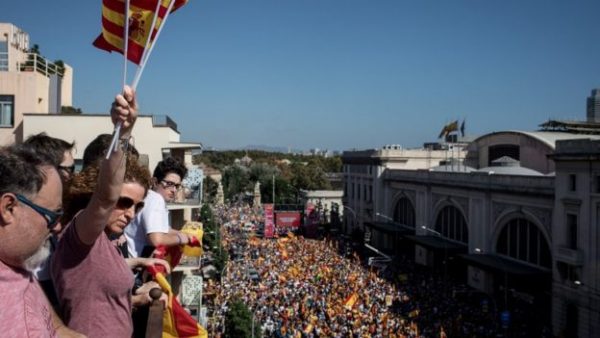
At least 350,000 people gathered in Barcelona, capital of Catalonia, for a rally against independence from Spain.
They waved Spanish and Catalan flags and carried banners saying “Together we are stronger” and “Catalonia is Spain”.
It was the largest such rally in Catalonia amid the furore over last week’s disputed independence referendum.
Spanish PM Mariano Rajoy has warned he would not rule out anything “within the law” to halt Catalan secession.
Similar rallies were held across Spain on Saturday.
The final results from the referendum in the wealthy north-eastern region suggested 90% of the 2.3 million people who voted backed independence. Turnout was 43%.There have been several claims of irregularities, and many ballot boxes were seized by Spanish police.
Nearly 900 people were injured as the police, trying to enforce a Spanish court ban on the vote, attempted to disperse voters.
Thirty-three police officers were also hurt.
Police in Barcelona said 350,000 people turned out for Sunday’s rally; organisers put the figure at 950,000.
Among them were former government minister Josep Borrell, who said his fellow Catalans needed to recover their level-headedness, and nobel laureate Mario Vargas Llosa.
“You need more than a coup plot to destroy what has been built over 500 years of history,” Vargas Llosa, the Peruvian-Spanish novelist, told the crowds.
One of those attending the rally was 72-year-old Araceli Ponze. She told Reuters: “We feel both Catalan and Spanish.
“We are facing a tremendous unknown. We will see what happens this week but we have to speak out very loudly so they know what we want.”
Similar unity rallies were held across Spain on Saturday
Catalan leader Carles Puigdemont is expected to address the regional parliament on Tuesday at 18:00 local time (16:00 GMT). Spain’s Constitutional Court suspended a Catalan parliament session that had been planned for Monday.
There had been speculation that independence would be declared unilaterally at the parliament’s next sitting, but an MP from Mr Puigdemont’s party said the current plan was to stop short of this.
Marta Pascal told the BBC that the leader would make a “symbolic statement”.
He would recognise the referendum and say that a large percentage of Catalans wanted independence, before talking about setting off along a path leading to independence, Ms Pascal added.
In an interview with El País newspaper on Saturday, Spain’s prime minister retained the tough line he and his government have taken over the referendum.
“The government will ensure that any declaration of independence will lead to nothing,” Mariano Rajoy said.
He also said he planned to keep extra police, deployed to Catalonia before the referendum, in the region until the crisis is over.
And he rejected calls for early national elections.
Asked whether he was prepared to invoke Article 155 of Spain’s constitution, which allows the national parliament to intervene in the running of an autonomous region, Mr Rajoy said: “I don’t rule out absolutely anything that is within the law.”
Nicola Sturgeon, Scotland’s first minister who lost a referendum on independence from the UK in 2014, said on Sunday that the only way to resolve the crisis was with “both sides coming together to try to find a way forward… that respects the rule of law, democracy and the right to choose”.
On Saturday, thousands of people calling for Spanish unity attended rallies in the capital Madrid. Other demonstrations – including in Barcelona – were also held urging political dialogue.
Meanwhile, businesses have continued to announce their departure from the Catalan region amid the ongoing political uncertainty.
BBC

Leave a Reply
You must be logged in to post a comment.